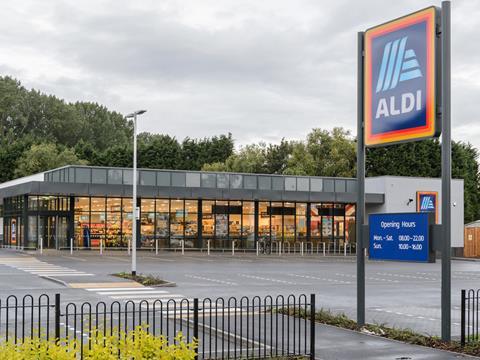
Top story
The UK’s big four grocers are no more as Aldi has overtaken Morrisons’ market share as private label sales continue to grow amid soaring inflation.
Take-home grocery sales increased by 3.8% in the 12 weeks to 4 September 2022 according to the latest figures from Kantar.
This is the third month in a row that the sector’s sales have grown after over a year in decline as a consequence of comparisons with the pandemic and grocery price inflation of 12.4% during the past month – a new record based on Kantar’s data.
Kantar said shoppers are taking steps to manage their budgets including broadening the range of stores they visit, with the discount grocers benefiting.
Aldi’s sales rose by 18.7% over the 12 weeks to 4 September 2022, reaching a 9.3% market share and making it Britain’s fourth largest supermarket for the first time. Meanwhile Lidl grew sales by 20.9% and its market share has increased to 7.1%.
Morrisons, however, saw its sales drop 4.1% to take its market share back to 9.1% from 9.8% last year.
Fraser McKevitt explains: “Back at the start of the 2010s, Tesco, Sainsbury’s, Asda and Morrisons together accounted for over three quarters of the sector but that traditional big four is no more. The discounters have seen dramatic sales increases in recent months, bringing more and more customers through their doors. Aldi has done well to expand its shopper base, supported by consistent store openings, and with 14.2 million consumers visiting the grocer in the past three months.”
The other three mults all saw modest sales increasing, with Tesco up 1.9%, Sainsbury’s up 1.5% and Asda up 2.2%.
Waitrose was the only other grocer in decline, down 4.7%, with Co-op up 2.7%, Iceland up 5.8% and Ocado up 5.2%.
Fraser McKevitt, head of retail and consumer insight at Kantar, commented: “It seems there’s no end in sight to grocery inflation as the rate at which food and drink prices are increasing continues to accelerate. Now standing at 12.4% for August, the latest figure means that the average annual grocery bill will go from £4,610 to £5,181 if consumers don’t make changes to what they buy and how they shop to cut costs.
“In what is a fiercely competitive sector, supermarkets are reacting to make sure they’re seen to acknowledge the challenges consumers are facing and offer best value, in particular by expanding their own-label ranges. Their efforts seem to be well received by consumers with sales of the very cheapest value own-label products up by 33% this period versus a year ago and nearly one in four baskets containing one of these lines. Overall spending on all retailer own-label lines was £393m higher during the latest four weeks, pushing own-label’s share of the market to 51.1%.”
Grocery inflation stands at 11.0% for the 12-week period ending 4 September 2022, with prices are rising fastest in markets such as milk, butter and dog food.
Morning update
Ocado Retail returned to growth of 2.7% in the third quarter, although warned that soaring inflation will hit its profits in the fourth quarter.
The group’s Q3 retail sales rose 2.7% to £532m and up 42% up on on the pre-Covid Q3 of 2019. The performance also represents a significant improvement versus the decline in Q2, and with Ocado guiding to stronger growth expected in Q4.
Growth was driven by record numbers of new customers, with active customer numbers grew 23% year-on-year to 946,000, driving an increase in average orders per week of 10.7%
However, while customers and orders have grown, consumers are shopping smaller baskets and seeking value-for-money items as they respond to inflationary pressures.
As a result, the value of the average basket was down by 6% in the period, to £116, with a greater decline experienced later in the quarter during the peak summer holiday season
Ocado’s average selling price has increased by 5% year on year, which is the net of a 7% inflationary increase in food price offset by a 2% decrease related to customers choosing lower priced alternative products.
In addition to trading down, customers are adding fewer items to their baskets. Average individual stocking keeping units per basket during the quarter was 45, down 10% compared with the same quarter last year, and now in line with pre-pandemic shopping patterns.
Ocado noted it is “not immune to the impact of inflationary pressures on the cost base”.
Its energy bills have grown to three times what it was in the prior year with fuel costs for the year also expected to be around 15% higher. At similar levels of use, this represents a £20-25m increase to the 2022 cost base compared with that of 2021. At the same time, largely as a result of knock-on effects of the energy crisis, the price of dry ice has sharply increased, adding a potential £15-20m in annualised cost compared with 2021 and the business is exploring alternatives to dry ice.
Ocado said these impacts are expected to further weigh on profitability in the fourth quarter.
In Q4, it guides to a combination of continued strong growth in customer numbers and orders to result in mid-single digit sales growth for the quarter.
However, this Q4 growth in revenue is not expected to be sufficient to generate full-year growth year-over-year and the group now expect to see a small sales decline in its 2022 financial year and close to break-even EBITDA.
Tim Steiner, Chairman of Ocado Retail, said: “We remain focussed on providing Ocado Retail customers with the best possible value to help them navigate the cost of living crisis, and are encouraged by the positive underlying trends in the business which underline the value of Ocado’s differentiated proposition to customers.
“Our online grocery model, which creates efficiency through advanced technology, offers customers a combination of competitive prices, the widest ranges, and industry-leading service. As we have seen in Q3, customer numbers are sharply up as consumers either switch from other providers or try online grocery for the first time; underlying productivity in fulfilment and the last mile continues to improve; and the new CEO of Ocado Retail, Hannah Gibson, brings fresh vision and energy to the business.
“As consumer spending stabilises, we expect Ocado Retail will again deliver attractive and accelerating growth in sales and a strong recovery in profitability.”
Elsewhere, premium mixer drinks group Fever-Tree has posted a double-digit first half rise in sales, but profits were hit by mounting shipping costs.
In the six months to 30 June, Fever-Tree posted revenue of £160.9m, which represented a year-on-year increase of 14%.
Growth was achieved despite the Omicron variant impacting on-trade performance at the start of the year, alongside logistics disruptions impacting the group’s ability to fulfil against the strong demand we are seeing in the US.
The wider on-trade market rebounded particularly well in the US and Southern Europe. In the US on-trade sales have been consistently ahead of pre-Covid, 2019 levels, and in Europe sales have built strongly to surpass 2019 levels, supported by the return of the tourism industry to Southern Europe.
In the UK the On-Trade has experienced a steadier build, with pre-Covid levels reached at the start of the second quarter, with overall UK sales up 6%.
US sales for the first half of the year increased by 11% to £40.1m (up 9% at constant currency), with demand for the brand significantly ahead of this result.
Its European business delivered a strong first half performance with revenue for the first half increasing by 27% year-on-year (31% at constant currency), driven by a strong return of the On-Trade in our key European markets, while Rest of the World was up 7% to £15m.
Fever-Tree said it has significant strategic progress since the start of the year, including the expansion into two adjacent categories; premium soft drinks in the UK and non-carbonated cocktail mixers in the US.
Alongside driving topline growth, the business said it remains extremely focused on mitigating the industry-wide cost impacts, as well as more specific cost headwinds, such as elevated sea freight costs, which it plans to gradually decrease our exposure to through the increasing localisation of production.
During the first half the group generated an adjusted EBITDA of £22m, which was a 24.7% decrease year-on-year.
Gross margins were hit by inflationary cost pressures and continued exposure to elevated Trans-Atlantic freight costs, which were only partially off-set by an improved channel and regional mix, and pricing actions taken in more established markets.
Despite these impacts Fever-Tree said it continues to invest behind the brand, with operating expenditure maintained at 23.7% of group revenue.
Tim Warrillow, CEO of Fever-Tree, commented “Fever-Tree has delivered a robust revenue performance in the first half of 2022, with a particularly strong performance in Europe as the On-Trade recovered. Demand has been strong in the US and we have continued to increase our availability on shelf enabling us to deliver a record month in August, a fantastic achievement by the team.
“The strength of the Fever-Tree brand is providing exciting opportunities to recruit new consumers and extend into significant adjacent categories, with the opportunity in premium soft drinks in the UK and non-carbonated cocktail mixers in the US both extremely compelling.
“The long-term opportunity for the business remains very significant and we continue to focus on investing in our products, marketing activities and our team. As the global leader of the premium mixer category we remain at the centre of the well-established trends to premiumisation and long-mixed drinks whilst also perfectly positioned to explore these incremental opportunities.”
Finally this morning, baby-boomer meals delivery service Parsley Box has posted a reduced first half loss as it cut marketing spend amid a sales slump.
Revenue fell by 32% period on period as high online shopping volumes experienced during the pandemic were not sustained, and new customer revenue reduced as marketing acquisition spend was cut back in the first quarter whilst new funds were sought.
Marketing expenses were reduced by 55% period on period, to 24% of revenue in the period, down from 36% a year ago, as the company exercised strict discipline on spend to focus on acquiring and retaining customers with potential higher lifetime values.
Product margins also rose due to a greater proportion of repeat customer orders and modest price increases at the start of the period, that increased average order values by 24% period on period.
That meant its adjusted EBITDA loss reduced by 42% to £2.1m from £3.6m despite the sales drop.
So far in its second half, the group has seen revenue for the first 10 weeks of the period in line with its first half and market guidance.
Notwithstanding the very challenging market conditions, it said the company is now in a better position to withstand the macro-economic pressures whilst continuing to develop a long-term future, and continues to trade in line with market forecasts.
Over the next 12 months the group will open new sales channels, initially focused on B2B opportunities in the public sector where our long shelf life, cupboard stored range is ideally suited to support some of the current challenges in the elderly care sector.
Additionally, the company is evaluating additional sales channels such as online marketplaces predominantly to support customers who are buying for relatives.
Kevin Dorren, CEO of Parsley Box, commented: “As with other retailers, 2022 has been challenging for the company as consumers feel the effects of the higher cost of living.
“We have continued to invest in product innovation to deliver category expansion with the launch of our larger portion and sharing meals to drive into additional meal occasions and more snacks and bakery to increase basket size.
“Parsley Box’s key competitive advantage is that 90% of our meals can be stored in the cupboard for up to 6 months and prepared in the microwave in minutes, so our customers can stock up to manage food price inflation and minimize their energy costs, key concerns for all UK consumers. The ease of storage and speed of preparation is also a significant benefit for the public sector, and we continue to investigate nascent B2B revenue channels in this area.
“We have taken a number of actions to adapt to the changing macro-economic climate, improve gross margins, and reduce overheads to conserve the £5.9m funds raised in March. The board remains focused on investment strategies to generate a longer term return to revenue growth, and are reorganising the business for the current revenue run rate to balance cash consumption.
“Despite the current market challenges, critically we have maintained the quality of our product and continued to deliver the high standard of service our customers deserve and following the actions taken the Company is now in a better position to withstand the macro-economic pressures whilst continuing to develop a long-term future.”
On the markets this morning, the FTSE 100 has edged up another 0.1% to 7,479.6pts.
Risers include Fever-Tree, up 13.1% to 1,073p, McBride, up 6.2% to 24.6p, Nichols, up 4.7% to 1,131p and Parsley Box, up 2.6% to 10p.
Fallers include Ocado, down 13.2% to 690.2p, Marks & Spencer, down 3.4% to 122.5p and Tesco, down 2.4% to 247p.
Yesterday in the City
The FTSE 100 started the week strongly, up 1.7% to 7,473pts to close at its highest level since 25 August.
UK supermarkets were amongst the strong risers included Marks & Spencer, up 7.7% to 126.7p, Tesco, up 5.5% to 253.1p and Sainsbury’s up 5.2% to 213.4.
Other risers included Glanbia, up 6.1% to €12.45, FeverTree, up 5.3% to 949p, Ocado, up 5.1% to 795.2p, Just Eat Takeaway.com, up 5% to 1,592p, Associated British Foods, up 3.8% to 1,406p, B&M European Value Retail, up 3.7% to 363.4p, Premier Foods, up 3.6% to 108.6p and SSP Group, up 3.5% to 233.5p.
The day’s few fallers included Nichols, down 5.3% to 1,080p, Bakkavor, down 3.9% to 95p, Tate & Lyle, down 3.3% to 735.8p and McBride, down 2.7% to 23.2p.







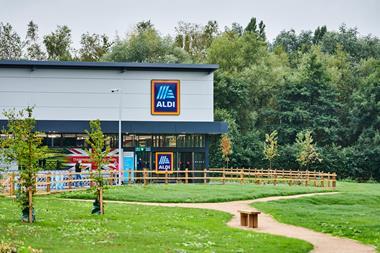
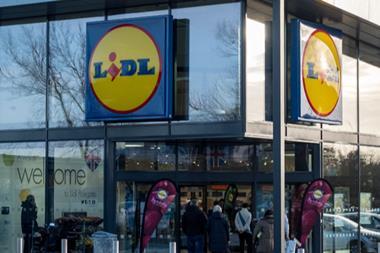
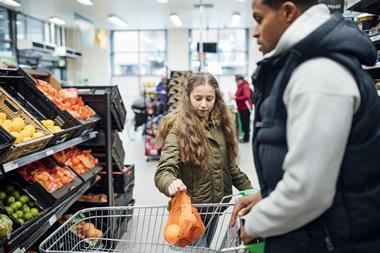
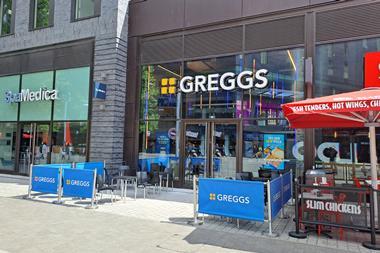
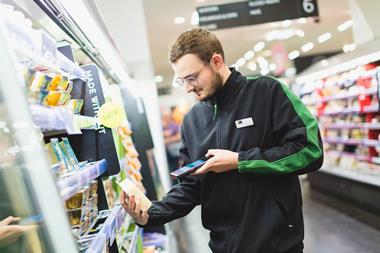






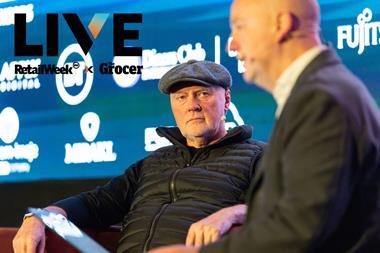
No comments yet